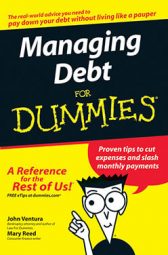If you don’t have enough money to pay all your living expenses and debts, do not take out a loan that will compound your financial problems. Although personal loans may give you temporary financial relief, more debt won’t fix your money problems. When it comes to improving your finances, you won't find any easy answers or shortcuts to common sense and dedicated budgeting. You've just got to bear down and do it.
Here are some loans to steer clear of — at all costs!
Advance fee loan: To get this kind of loan you must pay sometimes as much as several hundred dollars to the lender. Some advance fee lenders take your money and run, but others give you a very high interest loan. Traditional lenders do not make advance fee loans.
Finance company loan: Some finance company are less than honest about all the fees associated with the loan or may mislead you into thinking that you’re getting an unsecured loan when in fact the loan is secured by household goods, such as your furniture, entertainment center, and so on. (This detail is usually buried in the fine print of the loan agreement.) If you default on the loan, you risk losing the asset(s).Some finance companies encourage consumers to get a bigger loan than they can afford so they’ll end up in default.
Payday loan: To get this loan, you write a personal check to the lender for the amount of money you want to borrow plus a percentage of the loan amount or a set amount for every $50 or $100 you borrow. The lender pays you the amount of the check less its fee but does not cash your check.
On your next payday when you repay the loan, you get your check back. If you can’t repay the loan in full, the lender rolls over the loan until the following payday in exchange for another fee, which is higher than the first fee. If you keep rolling over the loan, the cost of the loan skyrockets and you have a harder and harder time paying it off.
Some states have payday loan laws. Contact a consumer law attorney or your state attorney general’s office to find out if your state has such a law and what your rights are.
Pawnshop loan: This is a short-term loan (no more than three months in most states) with a very high interest rate. Here's how this kind of loan works: You give the pawnshop an item that you own, like a TV, DVD player, piece of jewelry, or computer. The pawnshop lends you a percentage of the item’s value. At the end of the loan period, if you cannot afford to pay the loan plus interest, the pawnshop keeps your item and sells it.
Tax refund loan: Also known as a tax anticipation loan or an instant refund loan, this kind of loan involves borrowing against your future IRS tax refund. Some tax preparers, as well as finance companies, car lenders, retailers, and check cashing companies, make this kind of loan. Usually the loan will be for no more than $5,000, and it will last for no more than ten days.
In addition to having to pay very high interest on the loan, you must also pay the lender an upfront fee, and file your tax return electronically to the tune of about $40. So, when you consider the loan's interest plus the fees involved, the effective rate of interest you pay to borrow against your own money may be in the triple digits. When the IRS issues your tax refund, it deposits the money directly into an account set up by the lender’s, who takes its money and gives you what’s left.
Car title loan: If you own your car free and clear, some lenders will make you a short-term loan for a small fraction of what your car is worth. Usually the loan will be for no more than 30 days and will have a very high rate of interest. To get the loan, you must give the lender the title to your vehicle and a set of car keys. The major danger with this kind of loan is that if you miss even one loan payment, you risk the loss of your car. Depending on the loan agreement, all it may take is a single missed payment.
Friend or relative cosigner on a loan: If you cannot qualify for a loan from a traditional lender because of the state of your finances, think twice before you ask a friend or a family member help you get the loan by cosigning for it. If someone you know is the cosigner and then you fall behind on your loan payments, the lender will look to your friend or family member for the money you owe. Paying your loan may not only put your cosigner in a financial bind (and mess up that person's credit, too), but also ruin your relationship forever.
For-profit credit counseling agency loan advice: Always work with a nonprofit credit counseling agency, not a for-profit operation. A for-profit credit counseling agency is in business to make as much money as possible off your financial woes. Therefore, you cannot trust that the agency's recommendations are in your best interest. Some for-profit agencies may tell you to do things that make them money at your expense and that could get you into legal hot water.

